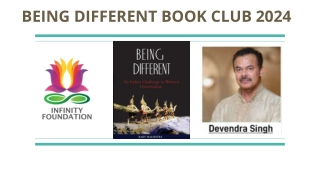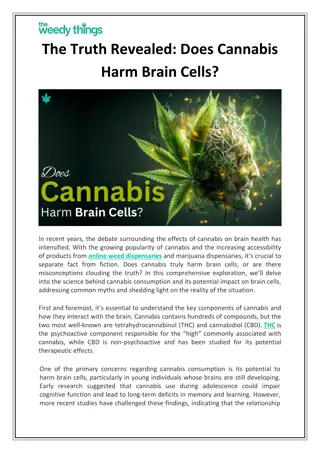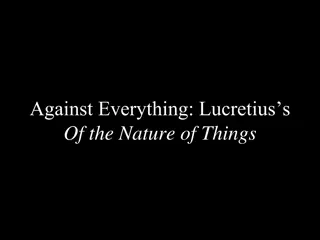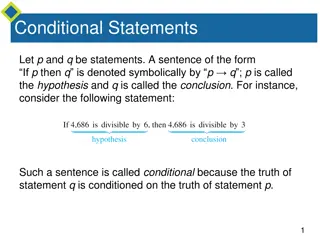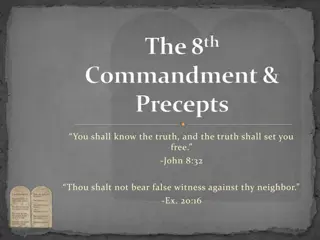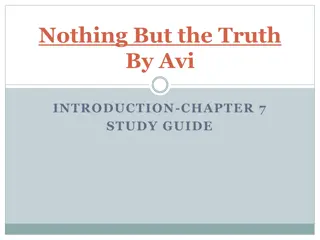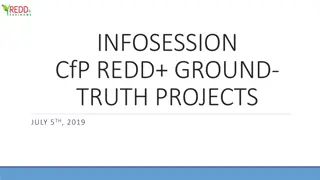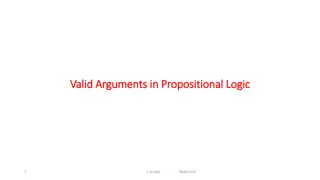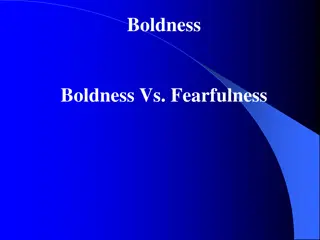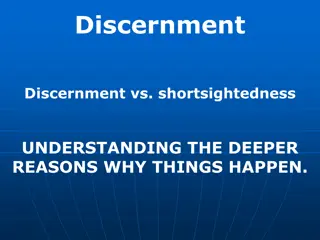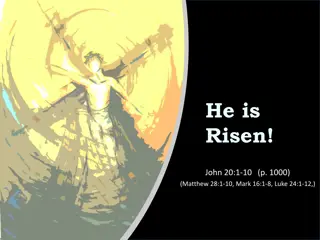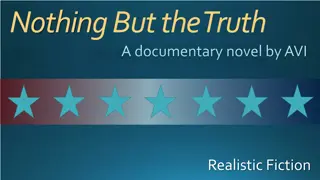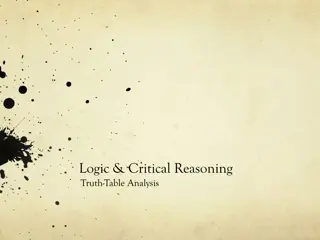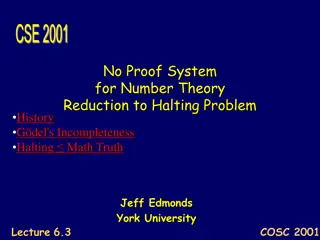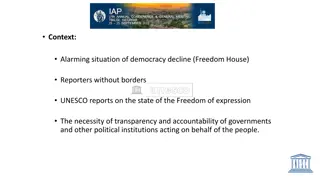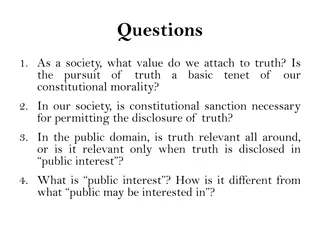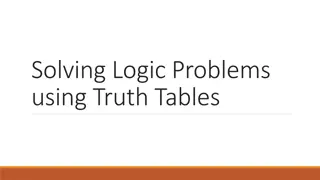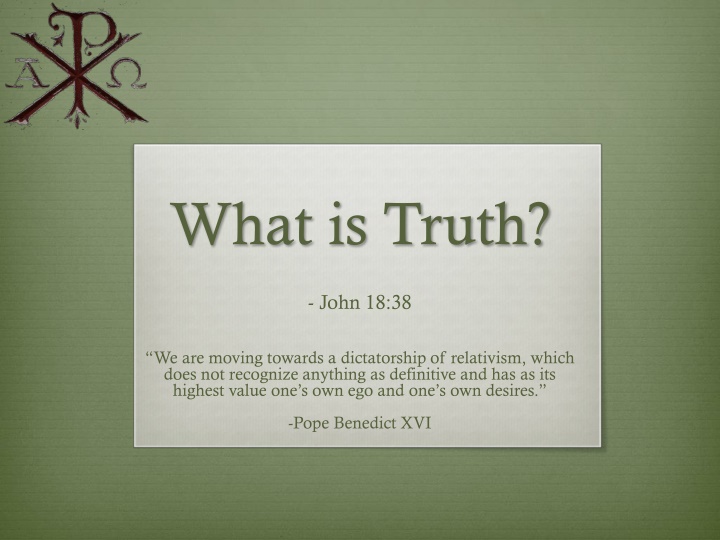
Truth, Reality, and Relativism in Philosophy
Explore the concepts of truth, reality, and relativism through the lenses of prominent philosophers like Aristotle and insights from Pope Benedict XVI and John Paul II. Discover the arguments against relativism and why it is considered unworkable in practice. Delve into the importance of faith, reason, and the search for ultimate truth in the pursuit of understanding existence and human destiny.
Download Presentation

Please find below an Image/Link to download the presentation.
The content on the website is provided AS IS for your information and personal use only. It may not be sold, licensed, or shared on other websites without obtaining consent from the author. If you encounter any issues during the download, it is possible that the publisher has removed the file from their server.
You are allowed to download the files provided on this website for personal or commercial use, subject to the condition that they are used lawfully. All files are the property of their respective owners.
The content on the website is provided AS IS for your information and personal use only. It may not be sold, licensed, or shared on other websites without obtaining consent from the author.
E N D
Presentation Transcript
What is Truth? - John 18:38 We are moving towards a dictatorship of relativism, which does not recognize anything as definitive and has as its highest value one s own ego and one s own desires. -Pope Benedict XVI
Reality Reality is what is, that which exists actually and independently of our minds. Truth is a statement that corresponds to reality This view presupposes that, at its most basic level, a thing either isor is not. It is impossible for the same thing to belong and not to belong at the same time to the same thing and in the same respect (with the appropriate qualifications) - Aristotle (Metaph IV 3 1005b19 20).
Faith and Reason The search for God is the search for truth, the ultimate truth: the truth about man, about existence, about the meaning of life and of our destiny after this mortal life has ended. To search for truth, one must presuppose that there is a truth to be found. Catholic theology has always upheld that truth is an objective reality knowable to human reason. Faith and reason are like two wings on which the human spirit rises to the contemplation oftruth; and God has placed in the human heart a desire to know the truth in a word, to know himself so that, by knowing and loving God, men and women may also come to the fullness of truth about themselves. -John Paul II, Fides et Ratio, 1998
Relativism The term relativism means the errant belief that there is no absolute truth; i.e., nothing is absolutely true at all times and under all circumstances. That may be true to you, but it s not true for me. Everybody has to discover their own truth. Just because something is right for you doesn t mean it s right for me. Don t push your beliefs on me; everybody needs to find their own truth about God. Ontological Relativism: There is no true and false. Moral Relativism: There is no right and wrong.
Arguments Against Relativism There are two strong arguments against relativism it is a self-contradictory it is unworkable in practice. Relativism as a logical system is self-contradictory. Consider the following syllogism: Major Premise: Nothing is true. Minor Premise: If nothing is true, then the statement Nothing is true must be false. Conclusion: Therefore, it is false that nothing is true.
Relativism is unworkable practically Relativism is unworkable practically. Human society would be unworkable if everybody lived day- to-day acting on the principle that nothing is true. While many profess relativism intellectually, nobody is able to consistently live as if it were true, for our day to day interactions with the world are based upon presuming that there are certain truths that are valid everywhere and at all times (architecture, mathematics, physics, etc). The source of relativism, like atheism, is rarely a problem of logic but more often a problem of morals; to admit to absolute truth would be to admit the possibility of a single Absolute Truth from which all other lesser truths derive their truth to which one would be bound to give full assent of their intellect and will.
God is Truth The sum of your word is truth; and every one of your righteous ordinances endures forever. -Psalm 119:160 The acknowledgment of the objective nature of truth leads the human mind inevitably to the ultimate question: what is the truth? What is the ultimate meaning of all things? This perennial quest for meaning by humanity is characterized by the search for the Ultimate Truth, a reality that everyone calls God. -St. Thomas Aquinas, STh I, 2, 3
Can Gods Existence be Proven? The existence of God cannot be proven in the sense of scientific mathematical proofs (as such proofs deal only with empirical data and God, as a supernatural Being, is outside the realm of empirical observation), but His existence can be arrived at with firm certainty by many converging and convincing arguments, which allow us to attain to certainty about the truth (CCC 31). The same holy mother Church holds and teaches that God, the beginning and end of allthings can be known, from created things, by the light of natural human reason: "for the invisible things of Him, from the creation of the world, are clearly seen, being understood by the things that are made. - (Vatican I, Dei Filius II)
Two Ways of Coming to Know God Catholic theology, following St. Paul, distinguishes two ways of coming to know of God from reason alone: the world the human person: For what can be known about God is plain because God has shown it to them. Eversince the creation of the world his invisible nature, namely, his eternal power and deity, has been clearly perceived in the things that have been made. (Rom 1:19-20) With his openness to truth and beauty, his sense of moral goodness, his freedom and thevoice of his conscience, with his longings for the infinite and for happiness, man questions himself about God s existence. In all this he discerns signs of his spiritual soul. ..... (CCC 33)
Reason is Limited Nevertheless, what can be known about God by human reason is very limited and revelation (a self- communication from God to man) is needed to make what explicitly clear what man, on his own, can only grasp imperfectly and with some admixture of error.
Philosophical Proofs for the Existence of God
The Argument from Efficient Causality Nothing creates itself. (premise). Therefore everything that exists either exists necessarily and eternally, or receives its existence from something else (extension of first premise). Receivers of existence do exist (premise). Two possible conclusions: The chain of being is infinite or finite. An infinite chain of receivers of existence is impossible (first conclusion eliminated). Therefore there exists a First Uncaused Cause of all existence (conclusion).
The Argument from Efficient Causality Existence is like a gift given from cause to effect. If there is no one who has the gift, the gift cannot be passed down the chain of receivers, however long or short the chain may be. If everyone has to borrow a certain book, but no one actually has it, then no one will ever get it. If there is no God who has existence by His own eternal nature, then the gift of existence cannot be passed down the chain of creatures and we can never get it. But we do get it; we exist. Therefore there must exist a God: an Uncaused Being who does not have to receive existence like us and like every other link in the chain of receivers. (Kreeft & Tacelli, Handbook of ChristianApologetics, 51)
The Design Argument The universe displays a staggering amount of intelligibility (premise) Either this intelligible order is the product of chance or of intelligent design (premise) The universe is too complex to be made by chance (premise) Therefore the universe is the product of intelligent design (conclusion) Design comes only from a mind, a designer Therefore the universe is the product of an intelligent designer
The Argument from Desire Every natural, innate desire in us corresponds to some real object that can satisfy that desire (major premise: relies on distinction between natural and artificial desires). But there exists in us a desire which nothing in time, nothing on earth, no creature can satisfy (minor premise: this requires only honest introspection). Therefore there must exist something more than time, earth and creatures, which can satisfy this desire (conclusion). This something is what people call God and life with God forever. (Taken from C.S. Lewis Mere Christianity, Bk. III, ch.10, Hope )
The Argument from Desire Creatures are not born with desires unless satisfaction for these desires exists. A baby feels hunger; well, there is such a thing as food. A duckling wants to swim; well, there is such a thing as water. Men feel sexual desire; well, there is such a thing as sex. If I find in myself a desire which no experience in this world can satisfy, the most probable explanation is that I was made for another world
Pascals Wager God Exist God Doesn t Exist Disappear into Nothingness Theism Eternal Happiness Disappear into Nothingness Atheism Eternal Suffering
Lesson content courtesy of www.unamsanctamcatholicam.com Power Points prepared by Catholic Presentations

